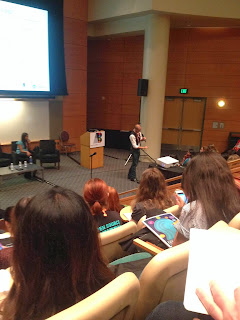While at GHC13 I’ve asked nearly every male I came in contact with about their experience at GHC. Time constraints limited me from asking a few but hopefully you will receive an email from me about this, and if you are a man reading this right now and attended this year or in years past please reach out to me, lets talk.
First thank you to every man who attended GHC13, I for one believe we need men to attend. There have been points made by a few women I spoke with that there must be some maximum percentage that would be best because just as some men aren’t comfortable discussing these issues with women in the room, some women aren’t comfortable speaking up with men in the room. I disagree, every male who wants to attend in support of women in computing, is willing to take part in the discussion and wants to understand the problems we face and how to overcome them should attend. Take a few minutes later to listen to The Broad Experience Episode 20: The Man Show. Where three men and a woman discuss a few of these issues. Did you know that there is a group for Men Advocating Real Change (MARC) in this arena? Check it out and share with some of your male colleagues.
You might say, but eventually the conference will change! Exactly. As the field we are in changes, our experiences and issues will change, and this Grace Hopper Celebration of Women in Computing should change to reflect the changing culture.
For now, back to the present. In one particular discussion I had at GHC13, there were three women and one man, we discussed how each of us felt when we saw him at the conference and how he felt in different situations. Remarkably even though we were all strangers to each other after a few minutes of talking we could be honest and open about this topic. I believe this is in part because of the personalities we had present, but also because no one was on the defense or offense, GHC is the one place I’ve found that creates an environment that makes honest discussion possible. Not once have I started this discussion with men at GHC and regretted it.
We had varying ages and experience levels present as well as varying backgrounds. The two other ladies and gentleman at the table were attending their first GHC. This was my 5th year attending and 6th year volunteering. For me it was great to see a handful of new male faces participating in sessions and giving talks as well as mixing with attendees and mentoring. For the other two women, they were hesitant at first, wanting to know why there were men here at all.
Most first timers to GHC are under the misconception that this is a women only conference, it is not, this is a Celebration of (not for) Women in Computing. In years past, and in this years sessions you will find male and female speakers in the program. This is incredibly useful, we cannot have a balanced discussion about equality in the work place with out all parties represented. For some attendees this is the first time they have been in a conversation about women in computing. Having a female majority experiencing the same biases they do is very useful, but it is just as useful to see that there are men willing to address the issues we face.
But how do we remove the stigma of men attending just as an attendee. I’ve heard from men that it is easier to answer the question why are you here when they can say “I am a speaker”, or “I am a recruiter”, or “my girlfriend/advisor/wife asked me to come” when the real answer is they support women in tech and attended to help advance the status of women in tech and celebrate women in computing. For me, and I believe most veteran attendees, this answer is a good one, but for some it is suspicious.
How do we make it easier for men who want to support us to attend, contribute, and grow? Just as we have women ABI Ambassadors whose job it is to bring the opportunities available to women back to their universities and organizations, we need a male ambassador group. What would they do? Attend sessions, take part in the discussion, take part in the solutions, learn from the sessions and bring back their experiences to their companies and networks! Be a point of contact for ABI to pass along opportunities to others. How do we make this possible? Well I’m working on it with the help of ABI and a few volunteers, so if you are interested leave a comment or contact me directly.
I will close with one last thought. By being in attendance these men are giving us permission to start these discussions. They most certainly aren’t going to attend GHC and expect NOT to talk about obstacles for women in computing. The definition of feminism is the belief that men and women should have equal rights and opportunities. This is a genderless word; as such feminist is also a genderless word. We all have unconscious biases, but we can consciously choose to work towards equal rights and opportunities, part of the goal of a conference like GHC is to provide a safe environment for addressing these issues, let’s address them together.

.jpg)